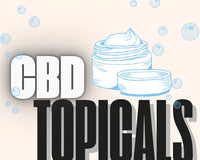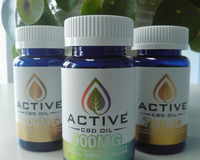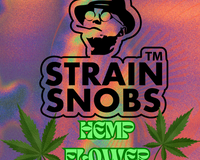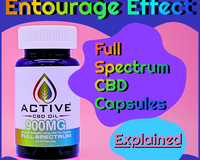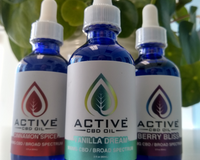If you have a passion for cannabis, you are likely familiar with delta-9-THC, which most people just call THC. Perhaps you are even groovy enough to be down with delta-8... However, many people who are knowledgeable about hemp and marijuana are not even aware of a little known cannabinoid that is quickly gaining in popularity: delta-10-tetrahydrocannabinol (delta-10-THC).
Find answers to some common questions below to learn more about delta-10 and the other forms of THC!

Delta-10 is nearly identical to delta-9, so why is it not better known?
The lab testing methods that allow us to easily distinguish between cannabinoids such as CBD, delta-9-THC, or CBG were not able to clearly distinguish between delta-10 and two other rare cannabinoids, CBC and CBL. Therefore, even when delta-10 would show up in small amounts during lab tests, it was mistaken for these other cannabinoids. It wasn’t until a recent serendipitous discovery of concentrated delta-10 that analytical methods to quickly distinguish delta-10 from CBC and CBL were developed for the commercial cannabis industry. Now extraction experts are enabled to identify and develop ways to produce more pure and concentrated forms of delta-10 by deriving it directly from other hemp cannabinoids. Cannabis enthusiasts are starting to get excited about the first retail delta-10 products becoming available, but we also still have a lot to learn about this new cannabinoid in the future - which is exciting to look forward to as well!
What is with these THC numbers? Delta-8 vs delta-9 vs delta-10?
The numbers used to differentiate these versions of tetrahydrocannabinol (THC) can understandably be confusing unless you happen to have a background in chemistry. The important point is there are slight differences in the molecular structure of each different form of THC, and the number indicates where that change is located in the molecule. This slight modification impacts how the molecule affects the receptors in the body, and thus it alters the overall effect a person may experience. Each of these unique structures with the same chemical skeleton are called isomers of THC, including delta-8, delta-9, and delta-10.

Due to this structural change delta-10 THC has become the more psychoactive compound compared to delta 9 THC when evaluating both their affinity for Cannabinoid receptors sites within brain tissue as well as potency. It has also been noted that the bioavailability range for Δ-THC falls somewhere around 21–27%. Delta 9 THC can also create more of a "high" effect than delta-10 THC, with patients receiving positive results for conditions such as glaucoma and chronic pain with delta 9 THC rather than delta 10.
For a more detailed answer explaining the difference between each version, and to learn about delta-1-THC and delta-2-THC, check out our blog, what is with these THC numbers?
Does delta-10-THC affect the body the same way as other THC varieties?
In general, the molecules are nearly identical and the body reacts and processes these THC backbones in very similar ways. Each isomer follows the same metabolic pathways and interacts with the endocannabinoid system. They are close enough that most common drug tests would not be able to tell the difference and each could cause a positive result for THC. However, the tiny difference in the structure of the THC isomers does affect how the molecule’s shape can interact with each receptor in the body. The interaction between the receptor and the molecule produces an effect, so the isomers can be substantially different from one another.
Delta 10 THC has a greater bioavailability than delta 9 THC which means it is more easily absorbed by fatty tissues within the brain thus increasing its potency. Studies have also shown that delta 10 THC may potentially require frequent dosing compared to most other cannabinoids. This information is however questionable as another study conducted using rats found delta-10 THC to be 20% less potent than Δ9 THC.
The subjective experience is reported to be distinguishable among the varieties of THC. In other words, people can tell the difference between them, with delta-9-THC being the most potent compared to delta-8 or delta-10. While there is consensus about delta-9 producing the strongest intoxication among those who have tried each of these cannabinoids, delta-8 and delta-10 have mixed reports about which of them is more potent. Some say delta-10 produces the weakest effect at an identical dosage, while others have said they notice a stronger effect which they prefer compared to delta-8.
Based on reviewing the limited experiences which have been shared online, many claim they find delta-8 to produce more of a relaxing body-sensation that is often associated with indica marijuana strains. Reports about delta-10 consistently describe an effect more common to sativa strains, including uplifting effects such as alertness and creativity. Keep in mind that everyone is different and experiences may vary, so with any new cannabinoid you decide to try, remember to start small and gradually increase.

How do the effects of delta-8 and delta-10 compare to CBD and CBG?
The biggest difference between the THC isomers, such as delta-8 and delta-10, and the previously available hemp-derived cannabinoids, such as CBD and CBG, is that the THC isomers may produce intoxicating effects.
Generally, CBD’s reported benefits are best described as the absence of a concern rather than feeling a strong effect. CBD does not produce effects such as intoxication or euphoria, so it is not generally appropriate to be looking for an effect other than a return to baseline well-being or simply feeling normal. For example, when people use CBD for anxiety, the benefit they seek is to no longer feel anxious but not to achieve a further positive mood boost such as euphoria. The same is generally true for CBG which is considered non-intoxicating. There is basically no recreational value, or fun, from taking CBD and CBG, compared to THC or even a recreational drug like alcohol. For some people who were hoping for an effect such as noticeable relaxation or a strong change in the way they feel, they can often be disappointed with CBD and CBG. Again, with these it is more about what you no longer notice that was bothering you, rather than being boosted into an altered state. For those who were hoping for a little more oomph to the effects from hemp cannabinoids, they should be pleased to finally have access to high quality delta-8, and in the near future to delta-10 as well.

Delta-8 and Delta-10 are much closer in structure to the main intoxicating component of cannabis, delta-9-THC, and therefore, they are capable of producing the more classic cannabis effect. However, each cannabinoid including THC, CBD, or CBG is often utilized by people for many of the same concerns as the others. In other words, there is overlap in the reasons people take these compounds, and we find they work better in combination than alone.
We offer these THC isomers as potentially helpful additions to other products, such as CBD, to provide a more complete spectrum of cannabis benefits via the entourage effect. If you are not familiar with this term, the entourage effect refers to the increased benefits when using a combination of cannabinoids and terpenes rather than one isolated molecule from the plant. For example, CBD and THC enhance the benefits of one another, while CBD helps reduce the side effects of THC such as intoxication.
Why do I see two different types of delta-10 on certain lab reports?
This is another confusing aspect of delta-10 to mention, that many molecules including THC can be formed in two versions, much like a left and right hand. Why does this matter? The structure of a molecule determines the biological activity. Cannabis plants only produce one form of most cannabinoids, such as delta-9, delta-8, and CBD. However, for delta-10, two versions are possible which can be individually tested for during potency analysis.

These two versions are (6aR,9S)-delta-10-THC and (6aR,9R)-delta-10-THC. The difference of whether there is a left or right handed shape along the molecule is indicated by the (9R) or (9S) in the name.
For a more detailed explanation of the difference between these two forms, check out our blog: Why are there two different types of delta-10 on lab reports?
How safe is delta-10?
Since delta-10-THC is so close in structure to delta-9-THC, the body responds in a fairly similar way to both compounds. The same considerations one gives to cannabis with delta-9-THC should also be given to delta-10 products. Delta-9-THC and its isomers, including delta-8 and delta-10, are generally considered by experts to be well tolerated by most people in common, small to moderately sized doses. The active dose of THC isomers are very low compared to known dangerous dosage levels, so the low doses most people use are generally considered relatively safe. One reason for this is the receptors activated by these cannabinoids are not located in areas of the body that maintain critical functions such as breathing, so these life-sustaining processes are not affected directly by THC isomers.
Keep in mind however, unlike delta-9 and delta-8, much less is known about delta-10 specifically from the available research. Since research done in humans is not available and only the similarities between the THC isomers provide clues to its effect on the body, reasonable consideration should be used if trying delta-10-THC. Every individual is different, so each person’s experience could potentially differ even at the same dosage. Our mantra for using cannabinoids is: remember to start with a low dose and gradually increase, so you can judge how your body reacts to a low dose initially, then add more slowly if desired. Especially with products like edibles, it may take longer to absorb and notice an effect than expected, and taking another dose too quickly is the easiest way to increase the chance of undesirable results.
The fact that delta cannabinoids produce antiinflammatory effects is very promising, but since this has only been tested on mice it might not be safe for humans yet. Aspirin, which has many beneficial effects such as preventing heart attacks and strokes and lowering blood pressure, was once thought to cause bleeding in the stomach when taken regularly in small doses until people discovered that cox 2 inhibitors like Vioxx and Celebrex prevent this side effect. Delta-9 THC has been found to have many benefits, including the treatment of anxiety, epilepsy, Parkinson's disease,delta 8 instead of just comparing them side by side.
Delta cannabinoids are inflammation reduction (similar to aspirin), appetite suppression (useful for treating cancer patients or those with wasting syndrome), glaucoma, AIDS-related dementia, nausea/vomiting caused by chemotherapy, muscle spasms caused by multiple sclerosis, short term memory loss caused by traumatic brain injury or stroke(6). Delta 9 THC is also useful at reducing the cravings associated with addiction to opioids and other addictive substances(7). Delta8 THC on the other hand is useful for reducing pain without producing much psychoactivity. It acts as an anti-inflammatory agent on the body's endocannabinoid system, which delta-9 THC also does(8). delta 9 THC is generally considered to be about 5 times more psychoactive than delta 8 THC. Since delta 9 THC has already been tested on humans it should be much more useful than delta-10 THC, so delta 9 THC might be a better choice to use for medicinal purposes.
Harmful effects of delta 10 or delta-8?
There are not many harmful effects associated with delta cannabinoids that have been noted due to the lack of testing that has been done on the subject. The fact that delta-10 can actually reduce inflammation and act as an antiinflammatory agent is very promising for its potential medical uses, since it hasn't yet been tested on humans. delta 8 THC by itself seems to have very little psychoactive effect, so delta 8 THC might be a better choice for medicinal purposes than delta-10 THC is since delta 9 THC has been tested on people already and it doesn't seem to cause any harmful effects according to information from the University of San Diego Medical Center (9). delta 10 THC can produce feelings of euphoria similar to delta 9 THC, but only in high doses(10). delta-8 THC doesn't produce much psychoactivity by itself either, but there might be an equilibrium point that could be found somewhere between delta 8 THC and delta 10-THC where both compounds are equally effective as antiinflammatory agents while also not producing noticeable psychoactive effect.
Some basic considerations generally apply to all THC isomers, whether delta-8, delta-9, or delta-10-THC:
Keep out of reach of children.
Must be 21 years of age or older to purchase.
May cause intoxicating effects. Do not drive or operate heavy machinery.
Do not use if pregnant or nursing.
If diagnosed with any health conditions or if using any medication, consult your physician prior to using.
May affect blood pressure, heart rate, and/or intraocular pressure.
Delta-10 and delta-8 metabolites will likely show up as a positive on a drug test for delta-9-THC.
These products are not intended to diagnose, treat, or cure any conditions.

Stay tuned for upcoming delta-10-THC products from Strain Snobs!
Until our delta-10 products are available, check out our wide selection of delta-8 and other hemp-derived cannabinoid products! Consider adding these to your hemp routine for a complete cannabis experience!
Resources:
“Is Delta-10 THC a Natural or Synthetic Cannabinoid?”
https://cannabislifenetwork.com/is-delta-10-thc-a-natural-or-synthetic-cannabinoid/
“Biological activity of the tetrahydrocannabinols”
https://www.sciencedirect.com/science/article/abs/pii/S0378874180810026
“Structure-Activity Relationships of the Cannabinoids”
https://archives.drugabuse.gov/sites/default/files/monograph79.pdf
“Comparison of acute oral toxicity of cannabinoids in rats, dogs and monkeys”
https://pubmed.ncbi.nlm.nih.gov/4199474/
“Establishment of a Domestic Hemp Production Program”
“UNSG_letter_ECDD41_recommendations_cannabis_24Jan19.pdf”
“Enantiomers, Diastereomers, Identical or Constitutional Isomers”
https://www.chemistrysteps.com/enantiomers-diastereomers-constitutional-isomers/
“Recap: The DEA Interim Final Rules”
https://newfrontierdata.com/cannabis-insights/recap-the-dea-interim-final-rules/
“Implementation of the Agriculture Improvement Act of 2018”
F.A.Q.
What is Delta-10-THC?
Delta-10-THC can be found in the Cannabis plant along with THC. This cannabinoid is psychoactive like THC but much weaker and can act as an agonist Delta 9.
What are the effects of Delta-10?
Delta-10 has a similar effect on its users as endorphins, a natural chemical within the body, but delta-10 is much stronger. The following effects have been recorded from delta-10 use:
- Increased collagen production in skin
- Heightened sensory awareness
- Heightened awareness to physical pain
- Increased flexibility and mobility of the joints
- Heightened olfactory acuity
What is the difference between Delta-10 and Delta-8?
The difference between Delta-8 and Delta-10 is that the first one has a hydroxyl group and second does not. Delta-8 THC is commonly used as an active ingredient in synthetic cannabis products such as K2 and Spice. Delta-10 THC is not found in nature but is identical to Delta-9 THC, which is the active ingredient in marijuana.
What is the difference between Delta-10 and Delta-9?
Delta-9 THC has a psychotropic (or mind altering) effect, whereas Delta-10 seems to lack this effect. Delta-9 THC is psychoactive, which means that the user will feel its effects when it enters the body. Delta-9 can cause a euphoric high in some people and in others it can produce increased sensory experiences.
Delta-10 THC (or Delta1-THC) is not psychoactive like CBD or CBDV. What makes this an appealing compound in the medical community is that there are no side effects to Delta-10. What does this mean? No negative, dangerous, or unpleasant reactions occur when taking this form of THC.
Delta-9 THC has a longer half life than Delta-10. What this means is that Delta-9 will stay in your system longer after you have used it. A half life for Delta-10 is about an hour or two, but the half life of Delta-9 THC is about seven days.



